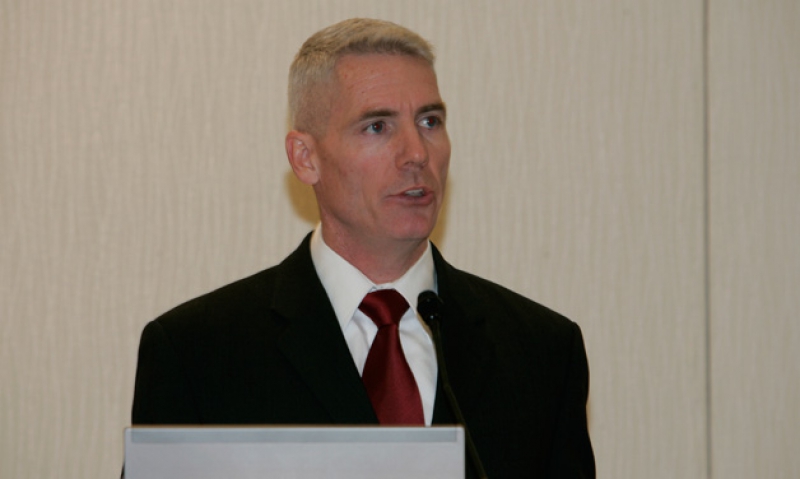
Lt. Col. Joseph Gallagher discussed with the Legion's National Security and Foreign Relations commission how Congress has consistently abdicated its war-making powers in favor of presidents.
Eleven years into U.S. intervention in Afghanistan, outlines for drawdown have only now come into focus. According to a Marine Corps lieutenant colonel working with the United Nations, this protracted engagement is one more symptom of a disjointed relationship between the executive and legislative branches that has persisted since the end of World War II.
Lt. Col. Joseph Gallagher addressed the joint session of the National Security and Foreign Relations commissions at the 52nd American Legion Washington Conference on Feb. 27. Gallagher served as a pilot, air officer and flight instructor in the Marine Corps operating forces. He later served in the U.S. European Command, USEUCOM and Joint Staff, Pakistan-Afghanistan Coordination Cell. He is currently the senior U.S. military observer for the United Nations Truce Supervision Organization, a peacekeeping operation and conflict monitor based in Jerusalem and Tel Aviv.
During Gallagher’s time at the U.S. Army War College, he developed his thesis, "Unconstitutional War: Strategic Risk in the Age of Congressional Abdication." Appearing out of uniform — to emphasize that his thoughts are his own and not representative of the military or government — Gallagher explained to Legionnaires that the Constitution and Federalist Papers originally provided for war-making authority to be shared between Congress (to commit the nation to war) and the president (to lead the nation in war). The framers felt that such powers "shouldn’t fall solely on one particular person or branch." Thus, a deliberative process between the two was seen as essential to outline reasons and objectives in committing the nation to war. The input of Congress, as "the branch most representative of the people," was seen as especially vital to garner popular support. As Gallagher put it, "it shows that Congress has skin in the game ... and by extension, America has skin in the game." To "look at the Constitution as a national-security document," he continued, is to see that as written, it is a blueprint for successful prosecution of war when it has the full consensus, decision and might of the United States behind it.
This process worked successfully through the end of World War II. However, the postwar global landscape, which pitted two major powers against each other and against a backdrop of nuclear weapons and Mutually Assured Destruction, "supported the climate of the executive to lead," Gallagher said, pinpointing President Harry Truman’s containment policy as the beginning of the end of constitutionally mandated executive-legislative interaction. With the growth of emergency situations related to Communist actions, the U.S. government went into a "crisis response mentality" — the president was given authority to make a decision and act on it quickly, and Congress "subordinated consensus to initiative," Gallagher said. U.S. involvement in the Korean War started when Truman sent troops in. Congress deliberated on and approved it later, but Truman had acted after the United Nations asked member states to help stabilize the region. Gallagher stated flatly, "I think that the United Nations should never, ever speak for the U.S. Congress in authorizing force."
Despite 162 notable deployments and "almost constant military intervention" since the end of World War II, Gallagher’s stark assessment is that "the United States hasn’t really won a war since the last time we declared war" — World War II. Conflicts after Korea followed its pattern — troops sent in by the executive branch with not-truly-defined objectives and parameters that Congress only deliberated on and approved after troop presence was already established. Gallagher said that this has led to "unacceptable vulnerability in our strategy." President George W. Bush stated in 2001 that the 9/11 terrorist attacks were an "act of war," but no war has ever been formally declared by the United States — merely congressional approval of troop action in Afghanistan and beyond. The U.S. purpose there has gone from counterterrorism, to counterinsurgency, to nation-building, to a combination of the three. In the meantime, U.S. dollars continue to be spent, and U.S. troops continue to die.
This problem of lack of communication seems no nearer a solution than during the Korean War. In 1973, Congress passed the War Powers Resolution over President Richard Nixon’s veto. It was intended to give Congress more authority, but had no real teeth. In 2009, members of a bipartisan National War Powers Commission testified before Congress, but nothing has come of it thus far. And Gallagher characterizes the third side of the triangle, the courts, as "absolutely silent" in resolving the constitutional problem (but usually coming down on the side of the executive branch when they try). Gallagher said that this disjointed relationship has "formed a cycle that is going to be extremely difficult to break." But the deliberation process is critical. "if we can’t identify objectives," he concluded, "we can’t justify expenditure of our blood and treasure."
Feb. 27 is the first day of meetings at the Washington Conference. The Commander’s Call will be streamed live Feb. 28 from 8:30-11:30 a.m. (EST) o.www.legion.org, and will feature speakers such as Agriculture Secretary Tom Vilsack; Holly Petraeus, head of the Office of Servicemember Affairs at the Consumer Financial Protection Bureau; and members of Congress.
- Washington Conference

